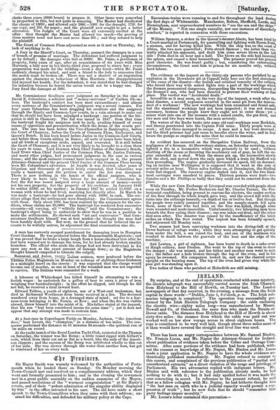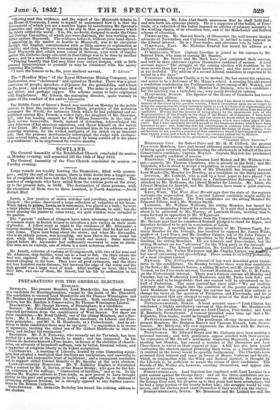IRELAND.
By surprise, and at the end of operations conducted with some mystery, the electric telegraph was successfully carried across the Irish Channel, from Holyhead to the Hill of Howth, on Tuesday last- The London newspapers of that day received, in the evening, a message from the Irish capital in these words—" Dublin, June 1,8 o'clock, p. m. The Irish sub- marine telegraph is completed." The operation was successfully per- formed by the Irish Electric Telegraph Company : the cable enclosing the electric wire—eighty miles long—was manufactured by Messrs. Newell and Co. of Gateshead, the same firm who made the Straits-of- Dover cable. The distance from Holyhead to the Hill of Howth is about sixty-five miles : the steamer from which the cable was paid out was worked well on her slow voyage across in about eighteen hours. The rope is considered to be very well laid, though about three miles more of it than would have covered the straight and level line was used.
There has been an angry correspondence between Mr. Samuel Bindon, Mr. Francis Lucas, and Mr. Napier the Attorney-General for Ireland, about publication of evidence taken before the Crime and Outrage Com- mittee. After some portions of the evidence had been published, wit]1- out the consent or knowledge of Mr. Napier, Mr. Bindon and Mr. Lucas made a joint application to Mr. Napier to have the whole evidence au- thentically published immediately. Mr. Napier refused to consent to this course, and complained of the preview' publication of "partial and unauthorized extracts," as a direct violation of the usage and privilege of Parliament. His two adversaries replied with indignant letters, Mr. Bindon said with reference to the publication already made, he had nothing to do with it ; but it had only spoiled before it was made the case concocting in secret. In reference to the present refusal, he said that as a fellow collegian with Me. Napier, he had hitherto thought him "the last man on earth who in a judicial capacity would permit a sup- pression of truth" ; but he now feels that he should "remember that
feelings impair morality." Lucas's letter contained this peroration-
Having read this evidence, and the report of the Maynooth debates in the House of 0311111201111, I seem to myself to understand how it is that the Government of which you are a member began by sanctioning Mr. Spooner's committee and ended by giving it the slip in that peculiar manner which has lately edified the world. You, Sir, no doubt, designed to make the Crime and Outrage Committee, of which you were chairman, the true working com- mittee against Maynooth. The evidence before it, without your hand direct- ly appearing in the matter as hostile to Maynooth, WM to be circulated through the English constituencies with as little answer or explanation as possible; and thus, while you were making in the House of Commons speeches about Maynooth that retain some colour of fairness, your work of slander against the Catholic clergy educated in that College was to be done by another agency, and in a more effective because a more indirect manner. "preying heartily that God may blast your unjust designs, with as little personal inconvenience to yourself as may be consistent with His mercy tempering His justice,
"I have the honour to be, Sir, your obedient servant, F. Lures."
The "Headley Mine" of the Royal Hibernian Mining Company, near cestlemaine, was "christened" and opened on Monday. There was a great concourse of people, speeches, a dejeuner for the gentlefolks, and a feast for the poor ; and everything went off well. The mine is to produce lead and silver, and perhaps copper. The scheme seems to have originated with Englishmen. Mr. Gibson, the managing director, spoke warmly in praise of the conduct of the native labourers.
The Dublin Court of Queen's Bench was crowded on Monday by the public anxious to hear the sentence on James Birch, proprietor of the notorious newspaper the Wald, for infamous libels which he had published and re- published against Mrs. French, a widow lady, the daughter of Mr. Brewster, 4.C., who was leading counsel for Sir William Somerville in the trial of Birch versus Somerville. Birch, instead of defending, acknowledged the utter falseness of his atrocious aspersions, and threw himself on the mercy of the Court. Mr. Justice Crampton so chastised him in his address on pro- nouncing sentence, for the wicked malignity of his attack on an innocent lady, that the prisoner involuntarily interrupted the Judge with exclama- tions several times, and at last was silenced by being carried off to his place of punishment : to be imprisoned for twelve months.



























 Previous page
Previous page